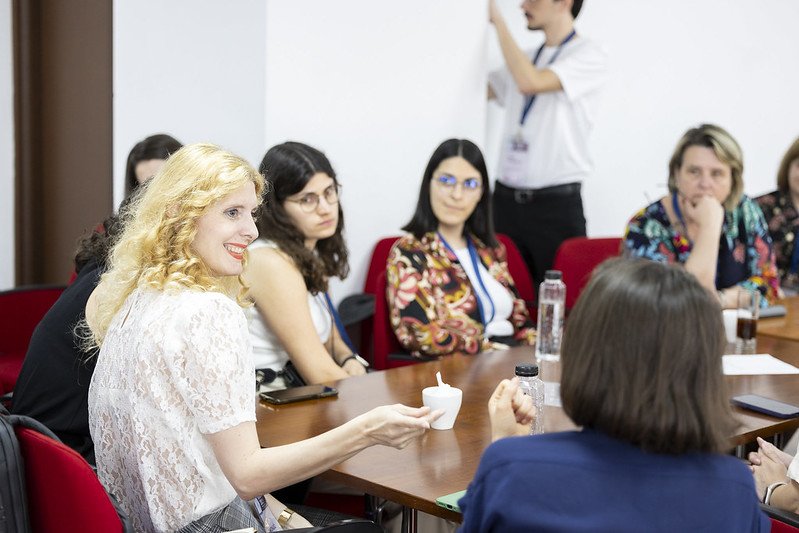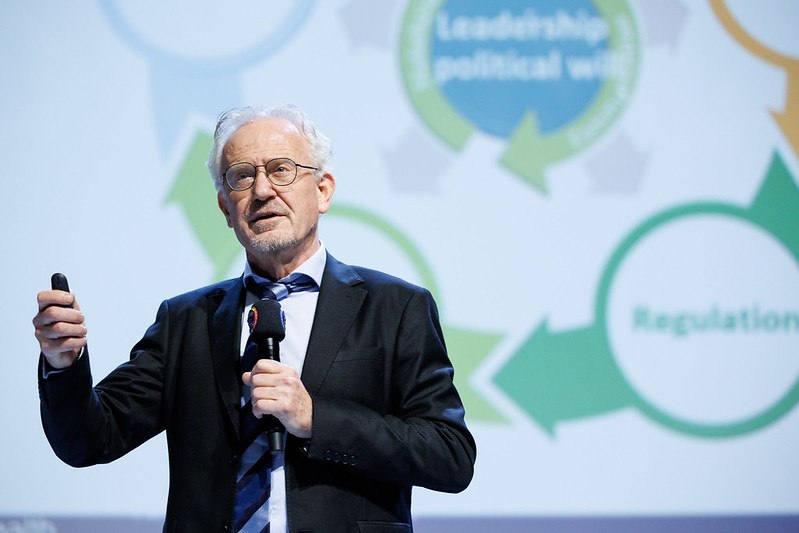EHMA 2025 is now ended. You will be able to download the Abstract Book, some Abstract PPT slides and watch the video here soon.
European Health Management Conference 2025 is co-hosted by the French School of Public Health (EHESP)
Health systems across Europe face unprecedented challenges that threaten the accessibility, equity, and sustainability of care. Today’s health services must respond not only to the immediate needs of patients but also to broader societal issues such as workforce shortages, the rise of chronic diseases, the impacts of digitalisation, and environmental sustainability. To address these critical challenges, this conference seeks to explore practical, scalable solutions and reimagine how health management can be mobilised to build healthier communities.
The title, ‘Taking action to improve health for all’, reflects our commitment to fostering dynamic, proactive health management that extends beyond traditional care facilities. We recognise that health management plays a crucial role in bridging the gap between policy and practice, ensuring that strategies translate into tangible benefits for citizens and communities. The goal is not just to manage health systems, but to actively shape them in ways that promote prevention, equity, and resilience across all levels – from system-wide initiatives to individual care.
At the heart of our approach is the understanding that nurturing healthier communities requires collective action. A siloed approach, where different sectors work in isolation, cannot adequately address the complex, interconnected health challenges of today. Instead, we advocate for a Health in All Policies and One Health approach, recognising that health outcomes are deeply influenced by factors outside the traditional healthcare sector. By considering environmental, economic, and social determinants of health, we ensure that policies are holistic and impactful, improving the wellbeing of both people and the planet.
Health management, therefore, must be a multi-level effort. It involves systems thinking to ensure equitable access and sustainability at a macro level, organisational leadership to drive innovation and integrate digital tools at the meso level, and empowering individuals to take charge of their health at the micro level. By embracing this vision, health managers act as facilitators of change, not just within healthcare facilities, but within entire communities.
This conference is a call to action: to mobilise health management as a force for creating healthier, more equitable societies. It invites professionals from across sectors to collaborate, innovate, and build resilient, integrated systems that put citizens at the centre of health policy and practice. Through collective effort, we can meet the demands of today’s health challenges and ensure the wellbeing of future generations.

“I am proud to invite health leaders, managers, and researchers from across Europe and beyond to gather in our ongoing mission to shape the future of health management. The theme for this year embodies our commitment to tackling the critical challenges facing health systems. With a dynamic programme, participants will explore the ways in which health management can be a transformative force in building healthier, more resilient communities. The discussions will not be limited to policy or theory; we will look to bridge the gap between strategy and practice, ensuring that health management drives tangible improvements for citizens at all levels of care. The European Health Management Conference 2025 will once again be the premier forum for thought leadership in health management.” – Antoni Peris – Grao, MD, President of the European Health Management Association.
Taking action to improve health for all
Tracks
Governance is the framework through which health systems and organisations set and oversee clear strategic goals to ensure the quality and safety of patient care, performance of services, as well as compliance with laws, regulations, and ethical responsibilities. Effective governance is essential to achieve objectives, drive improvement, and deliver the valued outcomes for citizens and patients. Governance is complex and evolving, and a universal common framework or simple concept of health systems governance does not yet exist.
Leadership is a key principle of governance and must be embedded within governance systems to ensure that systems and organisations are led to accomplish their objectives and meet their strategic goals.
Social responsibility is an ethical framework that underlines how the choices of individuals may affect the whole society. Applied to health management, social responsibility is strictly interlinked with the concepts of resilience and sustainability. Health professionals, health managers, and health systems should be accountable for their behaviours toward society.
This track would include abstracts that:
- analyse leadership theories, styles, approaches, knowledge, and skills required to meet the needs of health systems
- transfer theoretical perspectives to shape the development of a strategic focus
- focus on performance management, quality assurance, and patient safety
- are forward looking and anticipate future trends in health management and health systems
- explore the concepts of clinical and business governance
- discuss legal aspects and ethics of health services and systems
- evaluate the factors that impact the role of leaders within health and social care
- discuss ethical theories and aspects of health professionals, health managers, and health systems’ responsibility towards the society
- present best practices of responsible governance and leadership in health management.
The transition towards person-centred care requires health care systems to be integrated. This track focuses on the operations of organisations and systems. It pays attention to the efforts involved in the planning, organising, staffing, monitoring, directing, and decision-making processes of health services and systems to ensure the effective, efficient, and equitable use of resources.
The abstracts to be considered within this track include, but are not limited to those that:
- share insights from evidence-based research that translate management knowledge into practice contribute to better practice by sharing scalable and innovative models/solutions or improved processes
- identify key lessons based on rigorous analysis of existing practices and models
- provide case studies focusing on implementation of management models.
Health systems rely on their workforce. This track focuses on how human resources are managed to support the delivery of health services. This includes challenges relating to optimal planning, personnel shortages, the post-COVID ‘great resignation’, remunerations and incentives, and competence building.
Against this background, this track will include abstracts that:
- propose frameworks to measure the efficiency of workforce management models
- adopt quantitative approaches to compare transferrable management best practices as emerged in response to the ongoing European major challenges
- include the workforce perspective before and in the aftermath of the COVID-19 pandemic.
This track examines business planning and refers to how resources are raised, pooled, allocated or spent to ensure that people have access to health services of good quality without financial hardship. This includes issues related to efficiency, effectiveness, value and behaviour in the production and consumption of health and healthcare.
This track would include abstracts that:
- articulate the drivers of spending and the factors impacting total spending and value
- focus on the financial and economic concepts of health management, such as payment systems and models, budget modelling, investment decisions, health spending/costs
- address challenges in economic evaluation and decision models by highlighting best practices
- present the financial challenges and solutions to the current and future needs, such as the use of technology
- support in setting priorities in national, regional, or organisational contexts towards the best use of resources.
Beyond organisations, policy decisions made at the local, regional, national, and European level have an important impact on health systems, care, and practitioners. Policy mechanisms (e.g., regulation, financial, quality, and technical) can incentivise or hinder the adoption of innovative solutions to improve health outcomes. This track focuses on the development, planning, implementation, and evaluation of policies and regulations affecting health management at the organisational, local, regional, national, and European levels.
Abstracts submitted within this track would include those that:
- analyse relevant policy aspects of challenges in health management
- provide insight on public health challenges, paradigm shifts and health reforms
- share evidence and information on policy issues and possible solutions
- link health management and public health policies with practice
- discuss the involvement and impact of national policymakers, the European Union, as well as internal organisations on health systems.
Topics
People-centred systems
Patient-centricity has been a key topic within health systems, giving way to bringing in patients in the decision-making, planning, development, and monitoring of their care. Moving beyond patients and their conditions within the healthcare setting, people-centredness extends the concept to individuals, families, communities, and society and focus on population empowerment, as well as social services and broader health determinants.
This topic includes different models and processes to ensure that people are the priority when discussing value, developing new technologies, and analysing integrated care needs. Some questions to be answered are how to manage the paradigm shift to people-centred care and balance evidence-based healthcare management and patient preferences.
Healthcare access, delivery, and outcomes
Many subgroups of the population face inequalities and considerable barriers that impede access to healthcare resources and services and affect their health and wellbeing. There is a need for health systems to address the social determinants of health and disparities.
How can health systems ensure equitable access to health services, and achieve the delivery of better quality of care and better health outcomes? What are the new developments in models of healthcare delivery?
Sustainable and resilient health systems
To be sustainable European health systems need to adopt a wide understanding of sustainability considering economic, environmental, and social aspects. Sustainable health systems ensure the provision of appropriate and adequate care to patients, the affordability for payers (whether it is patients, families, employers, or governments), the adaptability to change, as well as the lowering of the negative impact of health systems on the environment. Health systems’ sustainability is interlinked with their resilience, namely their capacity to prepare for shocks, respond, minimise the impact, and embed lessons learned.
How can health systems participate towards achieving the sustainable development goals? Which strategies, processes, solutions can health systems and managers implement to ensure the sustainability of health systems? Including their resilience; emergency or pandemic preparedness; as well as health crisis management and prevention.
Health technology and digital transformation
Over the past years, the use of digital technologies in healthcare has increased. The digital transformation of health systems has been a priority topic for European health systems. The pandemic moved health technology and digital transformation even higher on European policy agendas, as proved by the election of the European Health Data Space as one of the key pillars of the European Health Union. One of the lessons learnt through the increased adoption of digital innovation is that although technology is essential, it is people that drive change.
Digital tools should connect and serve patients and professionals without losing sight of the social and human element of medicine. How can health systems ensure the effective adoption of digital innovation such as Artificial Intelligence and robotics? What is the impact of new technologies on population health and expenses? How can health systems build trust in digital innovation?
Workforce of the future
Future health systems depend on people and investing in the future of health systems means to invest in the health workforce of the future. As societal and technical evolution occur, the health workforce must rapidly change and adapt to safeguard patient and their wellbeing, as well as their professional existence. Healthcare is provided by people to people but sometimes healthcare workers are left with the hopeless feeling that they are ‘working together alone.
What are the needs of the health workforce? What are the key areas to invest in to support the health workforce? How will their upskilling, reskilling, and skill-mixing needs change? How do we address challenges relating to shortage and mobility of professionals? How can health managers support professional collaborations and relationships?
Speakers
What can you expect?
- Be part of the preeminent European conference on health management and contribute to achieving excellence in health management.
- An engaging conference that combines scientific presentations, keynotes, workshops and interactive discussions.
- Networking opportunities with a variety of stakeholders to identify, discuss and address current and future needs of health management in Europe and worldwide.
- 400+ representatives of the healthcare ecosystem including academia, research, health managers, healthcare professionals, decision- and policy-makers.
- The opportunity to showcase your work and research, highlighting best practices and sharing innovative ideas on health management with leading experts in the field.
Days
Presentations
Attendees
Abstract Submissions
Speakers
Testimonials

Every year I am excited about the EHMA conference, the biggest candy shop you can imagine! Difficult to choose out of so many interesting and inspiring presentations and discussions with stakeholders involved in health management all over the world. A great experience!
Dr Elly Breedveld, Director, Stichting Perspekt, The Netherlands

What I love about the EHMA Annual Conference is how it finds the balance between the strategic and the practical. The Conference identifies and brings to the table the most relevant policy topics with content that is engaging for practitioners as well.
Dr Josep Figueras, Director, European Observatory on Health Systems and Policies, Belgium

I have attended EHMA conferences for the past 10 years and I have always been hugely satisfied with the well-organised, interactive and friendly scientific and social programmes. Every conference provides opportunities to engage in discussions on relevant topics with different stakeholders in healthcare management. I highly recommend it!
Prof Sandra Buttigieg, Professor, University of Malta, Malta
Stay in Touch
Subscribe to our newsletter to stay updated on the latest EHMA news and conference developments!






























